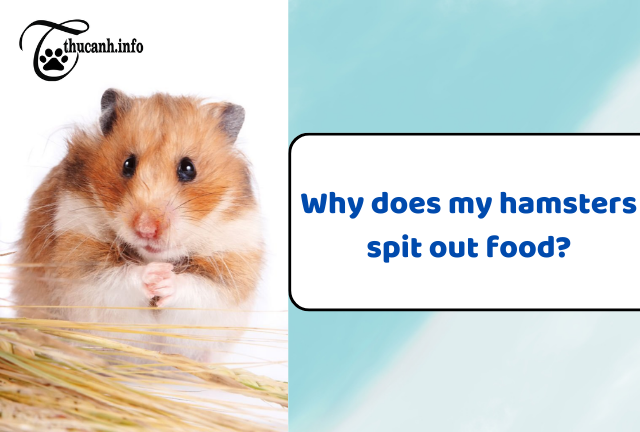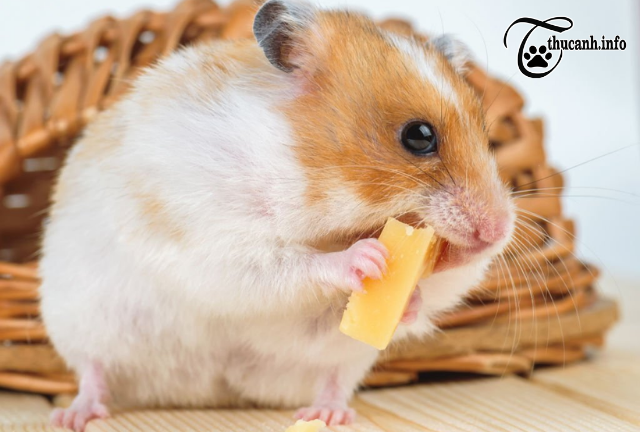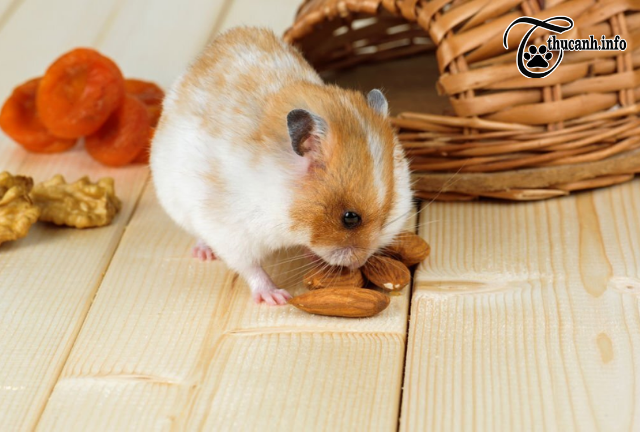Why does my hamsters spit out food? If you’ve noticed that your furry little friend has started to spit out its food, there could be a number of reasons for this behavior. As a responsible pet owner, it’s important to understand why hamsters may spit out their food and what you can do to prevent it. In this article, we’ll explore the possible causes behind this behavior and provide tips and tricks to help you stop your hamster from spitting out its food.

Understanding Hamster’s Food Spitting Habit
1. Why does my hamsters spit out food?
Food spitting, or food pouching, is a natural behavior for hamsters. Unlike humans, who chew their food thoroughly before swallowing, hamsters store their food in their cheeks and consume it at a later time. This behavior is an essential survival strategy in the wild, where hamsters must gather and store food quickly to avoid detection by predators.
However, sometimes hamsters will spit out their food instead of storing it in their cheeks. There are several reasons why this might occur, including:
| Dental Issues | Hamsters’ teeth never stop growing, which means they need to chew on hard objects to keep them at a manageable length. If a hamster’s teeth become too long, it can make it difficult or painful for them to eat, causing them to spit out their food. |
| Poor Diet | If your hamster isn’t getting enough of the right nutrients, they may either reject certain foods or not be able to properly digest them, leading to food spitting. |
| Overfeeding | Hamsters have small stomachs and require only a small amount of food each day. Overfeeding can cause them to feel uncomfortable or bloated, leading them to spit out excess food. |
| Illness or Injury | If your hamster is experiencing pain or discomfort while eating, they may spit out their food as a result. Additionally, illnesses such as diarrhea or dental infections can make it difficult for hamsters to eat or swallow. |
2. When Should You Be Concerned About Hamsters Spitting Out Their Food?
If your hamster is spitting out its food occasionally, it may not be a cause for concern. However, if your hamster is consistently spitting out its food or showing other signs of illness, such as lethargy or weight loss, you should take them to the veterinarian immediately.
3. How to Stop Your Hamster from Spitting Out Its Food

Curious Behavior: Hamsters Spitting Out Food?
If you’ve determined that your hamster is spitting out its food due to dental problems or illness, you should take them to the veterinarian to address the underlying issue. However, if your hamster is spitting out its food due to overfeeding or preference for fresh food, there are several things you can do:
3.1 Feed Your Hamster Smaller Portions
Instead of giving your hamster a large amount of food at once, try feeding them smaller portions throughout the day. This will give them time to digest their food and prevent overeating.
3.2 Offer Fresh Food
Make sure you’re offering your hamster fresh food regularly. Hamsters love fruits and vegetables, so try offering them a variety of options to keep them interested in their food.
3.3 Keep Their Teeth Healthy
To prevent dental problems, make sure your hamster has access to chew toys and hard foods, such as nuts and seeds. This will help keep their teeth healthy and prevent overgrowth.
4. Pros and Cons of Different Feeding Methods
There are several different feeding methods you can try to prevent your hamster from spitting out its food. Here are the pros and cons of each method:
4.1 Pellets
Pellets are a convenient food option for hamsters, but they can be dry and unappetizing. Make sure you’re offering fresh water along with the pellets to make them more palatable.
4.2 Fresh Food
Fresh food is a great way to provide your hamster with a variety of nutrients, but it can spoil quickly and attract pests. Make sure you’re removing any uneaten fresh food from your hamster’s cage regularly.
4.3 Homemade Diets
Homemade diets can be tailored to your hamster’s specific needs, but they can be time-consuming to prepare and may not provide a balanced diet. Make sure you’re consulting with a veterinarian before switching to a homemade diet.
5. Alternatives to Hamster Food

Hamsters and Food Spit: What’s the Reason?
If your hamster is consistently spitting out its food, you may want to try offering them some alternative food options, such as:
5.1 Treats
Hamsters love treats, and they can be a great way to supplement their diet. Just make sure you’re not overfeeding them or giving them treats that are high in sugar or fat.
5.2 Hay
Hay is a great source of fiber for hamsters and can help keep their teeth healthy. Make sure you’re offering fresh hay regularly and removing any old or moldy hay from their cage.
6. Step-by-Step Guide to Changing Your Hamster’s Diet
If you’ve determined that your hamster needs a change in diet, here’s a step-by-step guide to help you make the transition:
- Consult with a veterinarian to determine the best diet for your hamster’s specific needs.
- Gradually introduce new foods into your hamster’s diet, starting with small amounts and gradually increasing over time.
- Monitor your hamster’s behavior and health closely during the transition period.
- Remove any uneaten food from your hamster’s cage regularly to prevent spoilage and attract pests.
7. Comparing Different Hamster Foods
There are several different types of hamster food available on the market. Here’s a comparison of some popular options:
7.1 Pellets
Pellets are a convenient option that provide a balanced diet for your hamster. However, they can be dry and unappetizing, so make sure you’re offering fresh water along with the pellets.
7.2 Seed Mixes
Seed mixes are a popular option for hamsters, but they can be high in fat and lack essential nutrients. Make sure you’re supplementing your hamster’s diet with fresh fruits, vegetables, and hay.
7.3 Homemade Diets
Homemade diets can be tailored to your hamster’s specific needs, but they can be time-consuming to prepare and may not provide a balanced diet. Make sure you’re consulting with a veterinarian before switching to a homemade diet.
8. Tips for Feeding Your Hamster
Here are some tips to keep in mind when feeding your hamster:
| Offer Fresh Water | Make sure your hamster always has access to fresh water. Change their water daily and clean their water bottle or bowl regularly. |
| Provide Chew Toys | Hamsters need to chew to keep their teeth healthy. Offer them chew toys and hard foods, such as nuts and seeds, to help wear down their teeth. |
| Remove Uneaten Food | Remove any uneaten food from your hamster’s cage regularly to prevent spoilage and attract pests. |
9. The Best Way to Feed Your Hamster

Unraveling the Mystery: Hamsters and Food Spit
The best way to feed your hamster is to provide a balanced diet that includes a variety of foods, such as pellets, fresh fruits and vegetables, and hay. Make sure you’re offering fresh water and providing chew toys to help keep their teeth healthy.
- Provide a Balanced Diet: Offer a mix of high-quality pellets, fresh fruits, and vegetables to ensure your hamster gets essential nutrients.
- Include Hay: Incorporate hay into their diet to promote dental health and provide a source of fiber.
- Fresh Water: Always have fresh water available to keep your hamster hydrated.
- Chew Toys: Offer chew toys to help keep their teeth healthy and satisfy their natural gnawing instincts.
- Monitor Portion Size: Avoid overfeeding; hamsters have small stomachs and need only a small amount of food daily.
- Offer Variety: Rotate food options to keep mealtime exciting and prevent picky eating habits.
- Avoid Toxic Foods: Steer clear of foods that are toxic to hamsters, such as chocolate, onions, and garlic.
By following these feeding guidelines, you can ensure your hamster’s overall well-being and create a bond with your furry friend based on love and care.
10. Conclusion
If your hamster is spitting out its food, there could be several reasons for this behavior. By understanding the possible causes and implementing the tips and tricks we’ve shared in this article, you can help prevent your hamster from spitting out its food and ensure they’re getting a balanced diet.
11. FAQs
Q: Is it normal for hamsters to spit out their food?
A: Yes, food spitting is a natural behavior for hamsters, but it can also be a sign of underlying health issues.
Q: What should I do if my hamster is spitting out food?
A: Observe your hamster closely during feeding time and take them to a veterinarian if you notice any signs of dental issues, poor diet, overfeeding, or illness.
Q: Can overfeeding cause food spitting in hamsters?
A: Yes, overfeeding can cause hamsters to feel uncomfortable or bloated, leading them to spit out excess food.
Q: What are some appropriate treats for hamsters?
A: Hamsters enjoy a variety of treats, but it’s important to choose options that are high in protein and low in sugar and fat. Some good choices include small pieces of chicken or boiled egg, fresh fruits and vegetables, and small amounts of unsweetened cereal or whole-grain bread.
Q: How often should I feed my hamster?
A: Hamsters have small stomachs and require only a small amount of food each day. Feed your hamster a tablespoon or two of high-quality, balanced pellets or seeds each day, along with small amounts of fresh fruits and vegetables.
In short, the article on thucanh.info helps you understand why does my hamsters spit out food. Understanding why hamsters spit out food is important to their health. It could be due to dental problems, poor diet, overfeeding or even illness. If you notice any unusual behavior, consult your veterinarian for proper diagnosis and care. By meeting their dietary and overall health needs, you can ensure a happy and thriving hamster companion.


